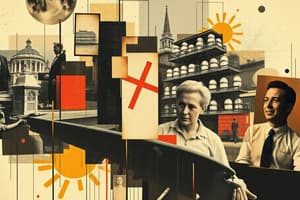Podcast
Questions and Answers
Which event marked a severe worldwide economic downturn that occurred during the late 2000s and early 2010s?
Which event marked a severe worldwide economic downturn that occurred during the late 2000s and early 2010s?
- September 11, 2001
- The Great War
- The Panic of 1857
- The Great Recession (correct)
What was the primary cause of the Panic of 1857 in the United States?
What was the primary cause of the Panic of 1857 in the United States?
- Corruption in government institutions
- Declining international economy and over-expansion (correct)
- Systemic inequality
- Systemic discrimination
What significant climate event occurred in 1816, leading to drastic temperature drops worldwide?
What significant climate event occurred in 1816, leading to drastic temperature drops worldwide?
- The Trail of Tears
- The Great War
- The Year Without Summer (correct)
- The Great Recession
Which historical event involved the forced relocation of Native American nations due to the Indian Removal Act?
Which historical event involved the forced relocation of Native American nations due to the Indian Removal Act?
What refers to the historical legal term for movable personal property, encompassing various assets?
What refers to the historical legal term for movable personal property, encompassing various assets?
How can technology be defined in the context of its application?
How can technology be defined in the context of its application?
What is the primary distinguishing factor between invention and discovery?
What is the primary distinguishing factor between invention and discovery?
Utilizing a professional tone in communication primarily helps to convey which of the following?
Utilizing a professional tone in communication primarily helps to convey which of the following?
What was the primary purpose of the Treaty of Tordesillas in 1494?
What was the primary purpose of the Treaty of Tordesillas in 1494?
Which entity issued the papal bull that led to the Treaty of Tordesillas?
Which entity issued the papal bull that led to the Treaty of Tordesillas?
What significant change occurred in the religious landscape of Western Europe in the 16th century?
What significant change occurred in the religious landscape of Western Europe in the 16th century?
What were the consequences of the exchange between the Old World and the New World?
What were the consequences of the exchange between the Old World and the New World?
Which statement accurately describes the term 'Old World' in relation to 1493?
Which statement accurately describes the term 'Old World' in relation to 1493?
How did Barbados's economy develop as a British colony in the early 17th century?
How did Barbados's economy develop as a British colony in the early 17th century?
What geographical line was established by the Treaty of Tordesillas?
What geographical line was established by the Treaty of Tordesillas?
What was the impact of Columbus's voyages in 1493 on global exploration?
What was the impact of Columbus's voyages in 1493 on global exploration?
What are the three primary change agents in historical analysis?
What are the three primary change agents in historical analysis?
How have technological advancements influenced historical change?
How have technological advancements influenced historical change?
Which historical movements exemplify ideological shifts as change agents?
Which historical movements exemplify ideological shifts as change agents?
What role does time play as a change agent in historical contexts?
What role does time play as a change agent in historical contexts?
How have socioeconomic forces impacted historical developments?
How have socioeconomic forces impacted historical developments?
Which of the following is NOT considered a direct change agent in history?
Which of the following is NOT considered a direct change agent in history?
What effect does the passage of time have on human civilization?
What effect does the passage of time have on human civilization?
Which historical period is often associated with significant ideological shifts?
Which historical period is often associated with significant ideological shifts?
What does the term 'slave school' metaphorically represent?
What does the term 'slave school' metaphorically represent?
What role did ocean currents play in Columbus's expeditions?
What role did ocean currents play in Columbus's expeditions?
Who financed Christopher Columbus's voyages across the Atlantic?
Who financed Christopher Columbus's voyages across the Atlantic?
Why were the letters written by explorers often composed in Latin?
Why were the letters written by explorers often composed in Latin?
What was a significant consequence of the Sargasso Sea's calm waters?
What was a significant consequence of the Sargasso Sea's calm waters?
What does the phrase 'establish kingdoms in various parts of the world whom God chose' indicate?
What does the phrase 'establish kingdoms in various parts of the world whom God chose' indicate?
What major factor influenced the navigation during the Age of Exploration?
What major factor influenced the navigation during the Age of Exploration?
What legend is associated with the treatment of horses in the Sargasso Sea?
What legend is associated with the treatment of horses in the Sargasso Sea?
What was a major consequence of the Columbian Exchange for Native Americans?
What was a major consequence of the Columbian Exchange for Native Americans?
What motivated many Europeans to migrate to the Americas?
What motivated many Europeans to migrate to the Americas?
Why did contracts become necessary during the Columbian Exchange?
Why did contracts become necessary during the Columbian Exchange?
What darker elements were associated with the Columbian Exchange?
What darker elements were associated with the Columbian Exchange?
What was a significant pursuit for explorers during the age of the Columbian Exchange?
What was a significant pursuit for explorers during the age of the Columbian Exchange?
How did the arrival of Europeans affect indigenous diets?
How did the arrival of Europeans affect indigenous diets?
Which group established a strong presence in the southwestern territories of North America?
Which group established a strong presence in the southwestern territories of North America?
What factor contributed to Europeans initially perceiving trade with indigenous groups positively?
What factor contributed to Europeans initially perceiving trade with indigenous groups positively?
Flashcards are hidden until you start studying
Study Notes
Change Agents and Historical Dynamics
- Change agents are catalysts for historical transformation, influencing societal development and outcomes.
- Key change agents include technological advancements, ideological shifts, and socioeconomic forces.
- Technological advancements have shaped societies from the agricultural revolution through the industrial revolution to the digital age, altering economies and production methods.
- Ideological shifts, like the Enlightenment and civil rights movements, challenge power structures and lead to social change, redefining societal norms.
- Socioeconomic forces such as urbanization and globalization influence social structures and international relations, driving both progress and conflict.
Time as a Change Agent
- Time significantly shapes historical events and societal transformations, leading to gradual evolution.
- Distinct historical periods like the Renaissance and Industrial Revolution mark transformative changes in human history.
- Long-term trends show demographic shifts, cultural evolution, and the rise and fall of civilizations due to societal adaptation over time.
- Historical context enhances the understanding of events, reflecting the dynamic nature of societies and their continuous adaptation.
- Interpretation of historical narratives evolves as societal perspectives mature and historical awareness deepens.
Notable Events in U.S. History
- World War I: Global conflict from July 28, 1914, to November 11, 1918, originating in Europe.
- Panic of 1857: Financial crisis in the U.S. due to declining international economies and domestic over-expansion.
- Great Recession: Severe worldwide economic downturn during the late 2000s and early 2010s.
- Year Without Summer (1816): Severe climate anomaly causing significant global temperature drops.
- September 11, 2001: Coordinated terrorist attacks by al-Qaeda on the United States.
Leasing and Land Acquisition
- Chattel: Historical term for movable personal property, encompassing both tangible and intangible assets.
- Trail of Tears: Forced relocation of Native American nations post-Indian Removal Act of 1830.
- Louisiana Purchase (1803): Acquisition of the Louisiana territory from France, significantly expanding U.S. land.
Understanding Technology, Discovery, and Invention
- Technology applies scientific knowledge for practical purposes, improving efficiency and productivity.
- Discovery refers to uncovering previously unknown insights, leading to new opportunities.
- Invention is the creation of something new, driven by creativity and problem-solving.
Colonial Dynamics and Exploration
- Treaty of Tordesillas (1494): Papal division of newly discovered lands between Spain and Portugal, shaping colonization efforts in the Americas.
- Old World vs. New World: Refers to established continents (Europe, Asia, Africa) contrasted against the Americas post-Columbus.
- Protestant Reformation: 16th-century movement challenging Catholic Church authority, leading to varied Protestant denominations.
- Barbados: Emerged as a significant British sugar-producing colony reliant on enslaved African labor.
Slave Culture and Education
- Enslaved Africans adopted the names of slave owners, erasing their original identities.
- Sargasso Sea: Calm waters historically trapped ships, leading to legends about horses being tossed overboard.
Navigational Knowledge and Expeditions
- Ocean currents like the Gulf Stream aided explorers like Columbus in navigating transatlantic voyages.
- King Ferdinand funded Columbus's expeditions to expand Spanish influence and wealth through new land discoveries.
Columbian Exchange
- The Columbian Exchange: Transfer of plants, animals, cultures, and diseases between the New and Old Worlds with profound impacts.
- Native American populations faced devastating losses due to diseases brought by Europeans.
- Economic motivations drove about 30% of European migrants to the Americas seeking new opportunities.
- Contracts became essential for dealings regarding land ownership and labor amidst the growing settler population.
Historical Perspectives on Exchange and Settlement
- The darker aspects of the Columbian Exchange include slavery and the exploitation of indigenous peoples.
- Explorers sought faster routes to Asia, leading to New World expeditions and territorial mapping.
- Indigenous peoples initially saw benefits from trade with Europeans but later faced dependency on imported goods.
- Spain controlled vital trade routes in the southwestern territories, affecting indigenous cultures and settlement dynamics.
Studying That Suits You
Use AI to generate personalized quizzes and flashcards to suit your learning preferences.




